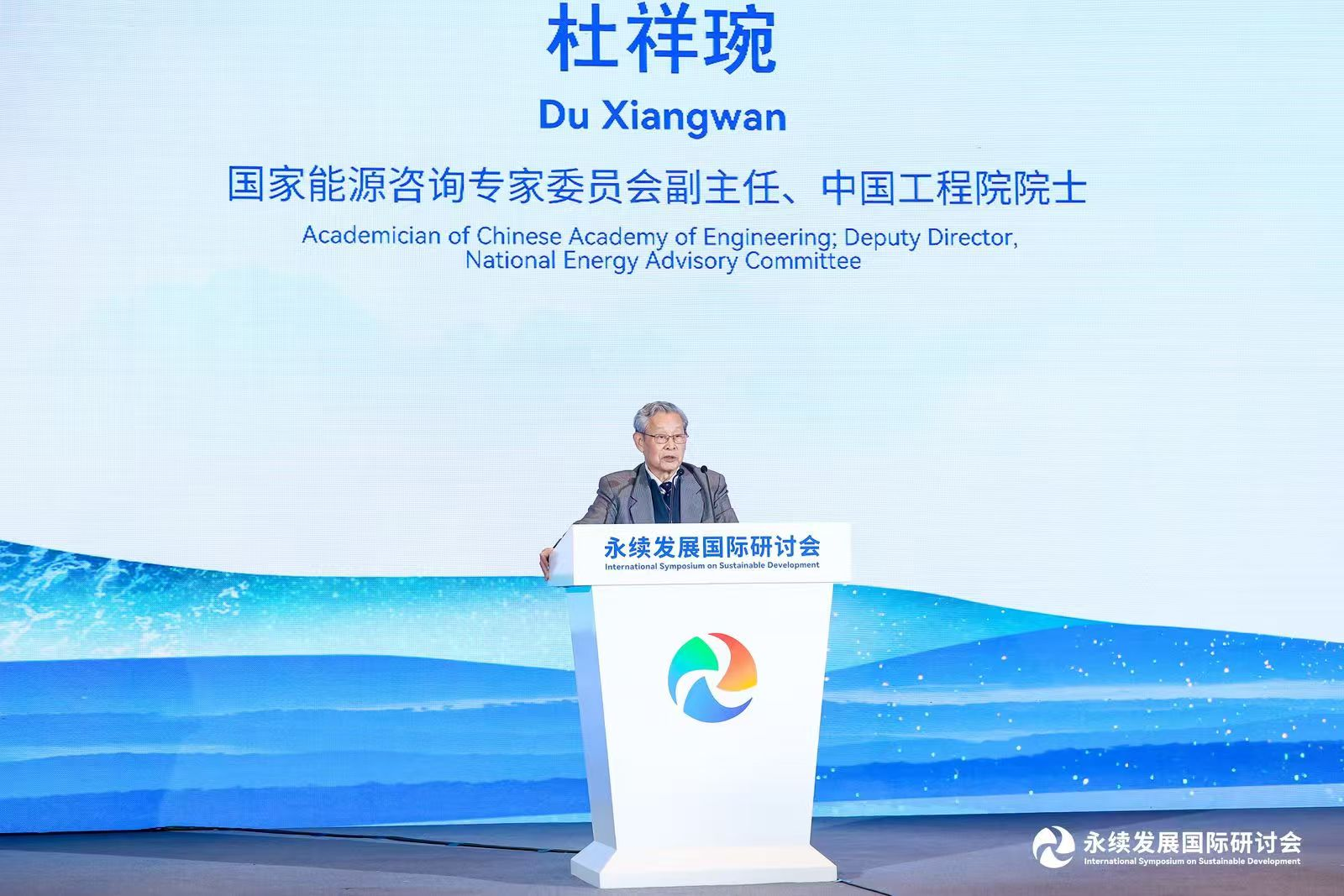Du Xiangwan, academician of China Academy of Engineering: From "coming from afar" to "taking from around", the energy revolution has brought about historic changes
"The energy system that calls for carbon peak and carbon neutrality must achieve a triangle of possibilities." From October 18 to 20, at the International Symposium on Sustainable Development, Du Xiangwan, deputy director of the National Energy Advisory Expert Committee and academician of China Academy of Engineering, shared the topic of energy security and energy transformation.

Du Xiangwan spoke at the scene. photo provided by the organizer
"Energy is a very important issue for China to achieve sustainable development." Du Xiangwan said that now we must re-understand the country's energy resource endowment. From the perspective of fossil energy, our country is "rich in coal, short of oil, and little gas." However, with the development of economy and society, renewable energy technology has improved and costs have dropped, and the demand and actual use of renewable energy have grown rapidly. Du Xiangwan believes that renewable energy is changing from insignificant to important importance in China and may assume great responsibilities in the future.
"It should be pointed out that the sustainability of renewable energy naturally exists with the existence of the sun, and its magnitude is related to technological development capabilities." Du Xiangwan said that in 2023, our country's installed capacity of renewable energy will reach 1.5 billion kilowatts, accounting for 51.9% of the country's total installed power generation capacity. The power generation of renewable energy will reach nearly 3 trillion kilowatt hours, close to the whole society. 1/3 of electricity consumption. Abundant renewable energy resources are an important part of our country's energy resource endowment. However, the renewable energy that has been developed now is less than 1/10 of the amount of technologically developable resources, so my country has a rich resource base for low-carbon energy transformation.
Du Xiangwan believes that in the past, due to insufficient understanding and limitations of energy resource endowments, many places faced situations of heavy loads but resource shortages. For example, because the eastern coastal provinces do not have fossil energy, they have become dependent on foreign calls and coal, which has also affected the formulation of national energy policies. At the same time, the utilization of renewable energy resources can be independently controlled by a country or region and will not change due to international geopolitics, which is conducive to the independence and security of the energy system. Therefore, low-carbon energy transformation and energy security go hand in hand. An accurate understanding of the country's energy resource endowment is an element for a correct understanding of the country's national conditions and has directional and strategic significance.
For traditional energy systems, safety, reliability, economic feasibility, green and low-carbon cannot be combined at the same time, so they are often called the "impossible triangle". However, high-quality economic development requires high-quality energy, and high-quality energy must build a triangle of possibilities. "Because safety and reliability are the basic requirement for the energy system, and only an economically feasible energy society accepts it, green and low-carbon is the direction of energy transformation. Therefore, the energy system that calls for carbon peak and carbon neutrality must achieve a 'possible triangle.'" Du Xiangwan said.
Du Xiangwan believes that wind energy and light energy are intermittent and volatile, so it is necessary to build a new power system that matches the gradual increase in the proportion of new energy. The key is to turn intermittent and volatile into flexibility, including flexible power generation and Flexible electricity use, so that wind and light become smart energy, and the key to intelligence is energy storage.
At present, the central and eastern regions should rely on renewable energy to obtain energy first from around them. Research has found that the cost of self-generation electricity in the east is lower than the cost of transmitting electricity from the west to the east. Therefore, the central and eastern regions should not only be consumers of energy, but also producers of energy. Du Xiangwan said, for example, that in Lankao, Henan Province, since July 2017, it has been identified as the first pilot county for the rural energy revolution. It has not only developed equipment manufacturing for wind and light, storage, electricity, and hydrogen, but also created a tens of billions of new energy. In industrial clusters, each farmer can also install 20,000 kilowatt-hours of photovoltaic power. In addition to its own use, each household can earn 6,000 to 7,000 yuan in revenue every year. It has not only completely eliminated firewood and loose coal, but also improved the rural living environment.
Lankao has witnessed the historic transformation of rural energy from "coming from afar" to "taking it from around". "In the future, my country will shift from government-run electricity + large enterprise-run electricity to government-run electricity + enterprise-run electricity + people-run electricity, realize an upgraded version of the energy revolution, promote social progress, and continue to write Lankao's experience." Du Xiangwan said.
"Carbon peak means that the economic growth curve and the carbon emission growth curve are decoupled, and the emergence of an inflection point means that a peak is reached." Du Xiangwan said that in the early stage of development, the curve has climbed upwards, but it will flatten out at a certain stage, that is, the economy continues to develop but carbon emissions no longer increase. The reasons include industrial structural adjustment and energy efficiency improvement.
"China is making progress on this path." Du Xiangwan said that high carbon is not the only way to development. The goal of our energy transformation is to comprehensively build a future-oriented energy system.







